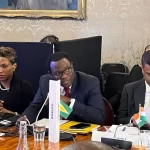The private sector has welcomed Government’s decision not to impose any new taxes in the 2023 Budget. However the sector is concerned about the lack of detail relating to several key measures intended to spur growth and improve efficiency in the public sector.
Responding to the budgetary proposals presented by Prime Minister Mia Mottley on Tuesday, Chairman of the Private Sector Association (BPSA) Trisha Tannis said there was “unanimous support for the announcement of no new imposition of taxes”.
“This is commendable by the Government of Barbados considering the challenges being experienced at both the domestic and corporate levels alike, the present inflationary environment, particularly against the context of the recent extension of the Social Compact,” said Tannis.
“Overall, the budgetary presentation was a highly-diversified statement which must now be carefully analysed for its impact and implementation effectiveness,” she said, while pledging the BPSA’s continued collaboration with stakeholders on national objectives for economic development.
However, Tannis said “There is also unanimity of thought that the absence of details pertaining to some of the measures announced presents an impediment to full analysis of the implementation and impact on businesses and the private sector.
“Whilst the BPSA welcomes all initiatives that improve the efficiency with which the Government of Barbados collects and secures tax revenue, serious concerns as to the operationalisation of these measures exist,” she said.
Mottley also announced a crackdown on the “misuse and abuse” of the duty-free system to plug millions of dollars in revenue losses. She said while there would be audits of the duty-free shopping sector, entities that benefit from concessions will be held to certain conditions.
However, with no details yet as to what the initiatives will look like, Tannis cautioned that “These measures must be implemented seamlessly so as to avoid compounding the present complexity of doing business in Barbados.
“In addition, we recommend clarity in regards to what aspects of the recommendations surrounding the amendment to the Customs Act were accepted, as this will have implications on how various tax structures are applied in the near future,” she added.
She noted that while the private sector has been privileged to “some aspects of state-owned enterprises reforms, a more detailed update as well as progress and impact on the budgetary estimates would have been preferred given the critical role that these reforms must play in rehabilitating the macro-economic performance of the country”.
Tannis argued that the overall framework to promote growth was not clearly identified in the budget, though indicating that the need for growth was well articulated.
She said the private sector appreciated the service sector oriented focus on the film industry and anticipated the identification of further measures to expand on the platform provided by the Government in the budget.
“We also encourage the accumulation and publication of more accurate data so that the assessment of economic output and income, particularly on the contribution of the services sectors, can be comprehensively assessed and published,” she said.
The private sector leader applauded the Mottley-led administration for efforts towards the training of young people, but cautioned that this must be free of political interference and bias.
“It is also critical that the systems and processes where challenge has been identified in the civil service, also be addressed for this initiative to have the best possible opportunity to succeed,” she added.
Tannis said the BPSA was of the view that Government’s plan to establish a Unit Trust and planned payday for over 5,400 Series B bondholders should help restore domestic confidence in the local capital market.
“We also highlight the fact that the commercial banking sector has signalled its intent to take the lead in this effort and participate in the local capital market more significantly after the restructuring of its debt portfolio in 2018,” said Tannis.
“The BPSA notes the continuing challenges as it relates to securing non-concessional international financing due to the non-investment grade of sovereign debt instruments,” she added.
She said the private sector did anticipate a focus on measures to promote tax efficiency as well as the challenge thrown out to the Social Partnership subcommittee to lead the implementation of a 24-hour economy by 2024.
Meanwhile, President of the Barbados Chamber of Commerce and Industry (BCCI) Anthony Branker described the 2023 Budget as “reasonable and quite fair”.
He said what stood out for him was the theme of transformation and training of young people.
“To me that is visionary. She also spoke about the investment in our infrastructure and innovation. That too, also speaks to where she sees the island, not this year or next year, but certainly in another five to ten years,” said Branker.
He told Barbados TODAY that he also welcomed news of the planned investment in several projects expected to begin this year.
He noted that the extension of the ease in Excise Tax and Value Added Tax on electric and hybrid vehicles was necessary given the difficulties associated with the importation of those vehicles.
“We are depending on external sources to supply us with a lot of what we need and it is not that easy,” said Branker.
He welcomed the government’s planned crackdown on the duty-free sector to limit revenue loss, saying “I think the government intends to tighten up on its tax collection which is something that we should expect and appreciate.”
While some critics have suggested that measures should have been announced to address the island’s high debt to GDP ratio, which stands at just over 120 per cent, Branker said there was no need for alarm.
He said he was particularly pleased that the island’s foreign exchange reserves had reached an all-time high of $2.99 billion.










